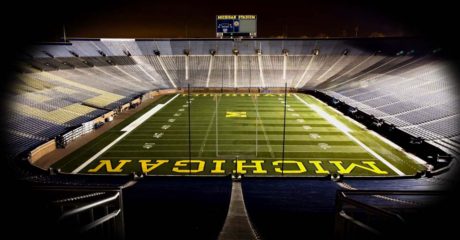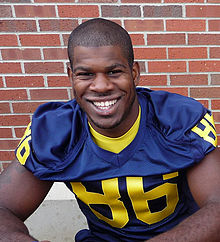This week I had the pleasure of talking to former Michigan co-captain Kevin Koger. Kevin played tight end from 2008-2011, and now is the receivers coach at Eastern Kentucky University. We had a really fun conversation that touched on a little bit of everything. In Part 1, we talk about his transition to coaching and the Michigan-Ohio State rivalry. In Part 2 (tomorrow) we get a little more in depth about the 2010 and 2011 seasons, and his perspective on the transition from Coach Rodriguez to Coach Hoke. I hope you enjoy!
On the Michigan-Ohio State rivalry:
You’re from Toledo, and your recruitment came down to Ohio State and Michigan. Describe your decision making process.
My dad is from Detroit, so my brother and I grew up Michigan fans. It really came down to those two schools; I really didn’t consider anybody else. Everyone thought I was going to Michigan, but I also wanted to check out Ohio State. They did a great job recruiting myself and my family, but at the end of the day, I just trusted what the Michigan staff was telling me more than the Ohio State staff. My comfort level at Michigan and the people that I knew there were ultimately the deciding factor.
Let’s focus on the win over Ohio State 2011. The offense clicked in a big way, and had probably its best performance of the season. Was the preparation for that game different?
We had a lot of confidence. If you remember we had lost to Michigan State, and then we had a win [vs. Purdue] and then lost at Iowa. We really felt that we had to get back on track. Then we go out and we did what we did to Nebraska [45-17 win], and it really boosted our confidence level. That was Nebraska’s first year in the conference and everybody was talking about them. Getting that win really boosted our confidence.
Frankly we were tired of losing to Ohio State. We were really invested, and those last few weeks leading up to The Game were more focused. Our ability to handle adversity in that game, and the weeks leading up it was huge. I remember [towards the end of the game] we had a penalty and had to [settle for] a field goal. I remember saying to Elliott Mealer on the field, “Elliott this game isn’t over.” Our team was able to respond to adversity.
Your touchdown catch ended up accounting for the game winning points in 2011. You were wide open on that play. What was your reaction to the play call in the huddle?
I forget exactly why, but we had more time in the huddle than usual. The play came in and I wasn’t really sure if it would work. I think David Molk saw the reaction on my face and he said, “Hey this is a great play call. We’ve been running out of this formation all game.” I thought about it and bought into it.
The biggest coaching point I got all week was that I just could not get jammed at the line. So all I was thinking about at the line was a clean release and staying low. That was my main thought going into the play, and I let everything else follow. It was a Denard rollout. I thought they’d suck in on the play-action fake and Denard would run around the edge for a touchdown. I hoped that he would, so I could get a block and spring him. He was the best player on our team and I was expecting him to keep the ball.
On the play, though, he had pressure in his face and he threw it. I really didn’t have time to think about it. One of the biggest things I remember about that play is that I threw up some touchdown celebration and Kelvin Grady and Devin Gardner were making fun of me as I got to the sideline. It was a lot of fun.
On his current job at Eastern Kentucky University:
How has your perspective changed from when you were a player?
Two things stand out. First, I can’t just sit down and watch a normal game as a fan anymore. I find myself analyzing it to see what defense they’re playing. I try to see what I would call on offense if I was the offensive coordinator. It’s hard to just leisurely watch a game.
Secondly, once I got into coaching I realized how much of the game I did not now. I had some great coaching [at Michigan], but just as a player you’re so worried about what you have do on the field and where you have to go. You’re not as worried about schemes. As a tight end all I would worry about was running a certain route – maybe I have to clear out a safety because I have a 15-yard dig coming behind me. Coaching was a bit of a shock at first, and there was a learning curve I had to go through.
What are you trying to teach the receivers at EKU?
Right now the biggest thing I’m preaching to those guys is just to pick one thing per day to get better at. Some younger guys today have a hard time focusing on more than one thing at one time. Sometimes it is it is route depth, or physicality with their hands, or even just effort level. Just challenging guys to do one thing every day so they’re not overwhelmed. We have a couple new guys in the wide receiver room and there is a lot going on, and they’re swimming a little bit, but if they can latch onto one thing per day, eventually the finished product will be what they want it to be.
What would you tell a recruit who is considering EKU?
It is a great time to be a Colonel at Eastern Kentucky. We have a brand new renovated weight room that went from 5,000 to 12,000 square feet that our players are really excited about. Starting in August we will have a brand new locker room. This year’s recruits could be the very first people in their lockers. The experience we have on the staff is great, and everybody has coached in the Big 10, SEC or NFL level. We’re going to do great things here.
Now with some time as a coach under your belt, what would you go back and teach to a freshman Kevin Koger? What do you wish you had known when you entered college?
Don’t worry about the mistakes. I think as a young guy who played so early I was worried about making a mistake. I was thinking I had to be perfect on every single play. Obviously that’s what you strive for, but you need to realize that you’re going to mess some things up. That’s the way life and the game of football work. You need to be resilient and work through those mistakes and work through those failures. When you’re younger and one bad thing happens you think it is the end of the world. That’s going to happen in the game of football – you’re going to get beat. I remember Coach [Calvin] Magee telling me, “Hey those guys on the other side of the ball, they have scholarships too. They practice, too. They’re going to make plays, and you’re going to lose every now and then, but how are you going to respond?” That would be a good message for a young Kevin Koger.
Check out Part 2 tomorrow to get Kevin’s insight on Coach Rodriguez, Coach Hoke, and the 2010 and 2011 seasons.
You need to login in order to vote



This was a great interview – looking forward to part 2!
You need to login in order to vote